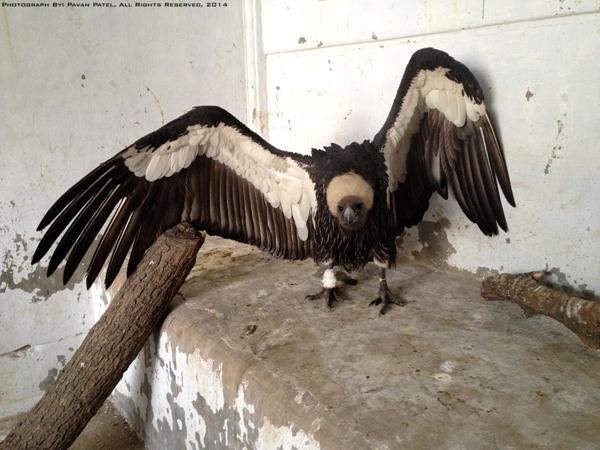Aditya A Roy
Other projects
10 Sep 2015
Conservation of Gyps Vultures in Gujarat: An Integrated Approach of Ecology, Advocacy and Awareness
Conservation of Gyps vultures through awareness, advocacy, rescue & rehabilitation and monitoring of nesting and feeding sites.

Vulture recovering after treatment of visceral gout.
The work done under this project will be a great supplement to the ongoing work of creating a diclofenac free vulture safe zone in 100km radii area around Ahmadabad. This support by RSGF and MBZ will aid in this project by allowing us to do more rigorous & regular vulture monitoring and intensive advocacy & awareness work. Overall outcome of the project will be creation of diclofenac free vulture safe zone of approx. 30,000 sq.km surrounding Ahmadabad. The outcomes of the project will be mainly in two areas:
Advocacy and Awareness:
- Sensitization of Vets and Para-vets by regular meetings resulting in reduced spill over of human diclofenac into veterinary sector
- Intensive interactions with panjrapols will ensure safe feeding sites
- Awareness amongst villagers will help to safeguard the nesting sites and also generate local leaders who can carryon monitoring of nesting colonies after the project is over. This will also help in getting more and more dead/sick/injured vultures.
- Strong advocacy with various stake holders like forest officials, drug controller and drug inspectors, animal husbandry & dairy officers and district level administrative officers will help to get legal action towards conserving vultures.
- Estimation of prevalence of human diclofenac in veterinary use through repeated survey of pharmacies
Vulture Ecology:
- Estimation of total vulture population of study area
- Enumeration and mapping of active nests
- Estimation of nesting success
- Identification of new nesting/roosting colonies
- Maintenance of safe feeding sites at all the panjrapols
- Identification and mapping of new feeding sites
- Identification of shallow water bodies suitable for vultures
- Rescue, treatment and necropsy, sample collection and analysis at suitable lab
- Inter-relations between various nesting colonies in the study area
Activities and Methodology:
1. Nest monitoring of Gyps vultures (G. bengalensis & G. indicus) across Central Gujarat (Oct-April)
- All nests will be located on GPS and given a unique id number
- Habitat parameters like nest height, tree/cliff height, tree species, distance from neighbouring nests, temperature of nesting site etc. will be recorded. Each nest will be photographed using long range lens without disturbing the nesting birds.
- Number of nesting/non nesting individuals, fledglings etc. will be recorded to get the colony structure
- Estimation of nesting success: success if the fledgling flies from the nest, failure if the fledgling dies or egg fails to incubate
- Local individuals for long term colony monitoring will be Identified and trained.
2. Awareness and advocacy work throughout the year
- Distribution of printed literature in local language, literature will be designed separately for each target group i.e. veterinarians, Para-vets, chemists, panjrapols, cattle owners, students, skinners, villagers at the nesting site
- Films and presentations will be shown to each target group
- Regular meetings will be held with various stakeholders
3. Rescue operation
Vulture rescue work is being conducted since 2005 in Ahmadabad and surrounding areas and state of the art veterinary facility at Jivdaya Charitable Trust, Ahmadabad will be utilized for treating injured/sick vultures and doing post-mortems of dead vultures.